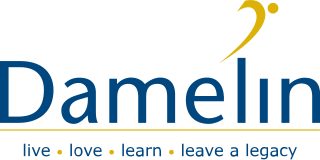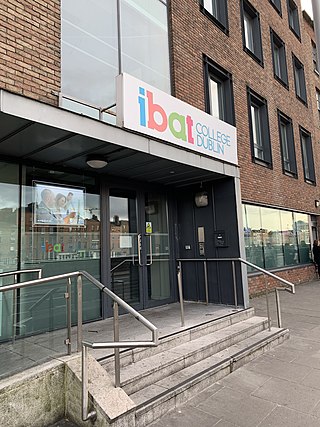Related Research Articles

Vocational education is education that prepares people for a skilled craft as an artisan, trade as a tradesperson, or work as a technician. Vocational education can also be seen as that type of education given to an individual to prepare that individual to be gainfully employed or self employed with requisite skill. Vocational education is known by a variety of names, depending on the country concerned, including career and technical education, or acronyms such as TVET and TAFE.
Education in England is overseen by the Department for Education. Local government authorities are responsible for implementing policy for public education and state-funded schools at a local level. State-funded schools may be selective grammar schools or non-selective comprehensive schools. All state schools are subject to assessment and inspection by the government department Ofsted. England also has private schools and home education; legally, parents may choose to educate their children by any suitable means.

A comprehensive school is a secondary school for pupils aged 11–16 or 11–18, that does not select its intake on the basis of academic achievement or aptitude, in contrast to a selective school system where admission is restricted on the basis of selection criteria, usually academic performance. The term is commonly used in relation to England and Wales, where comprehensive schools were introduced as state schools on an experimental basis in the 1940s and became more widespread from 1965.

Kaplan, Inc. is an international educational services company that provides education and training services to colleges, universities, businesses and individuals around the world. Founded in 1938 by Stanley Kaplan, the company offers a variety of test preparation, professional training, career development, language training, university and student support services. The company is headquartered in Fort Lauderdale, Florida, and is a wholly owned subsidiary of Graham Holdings Company.

Third-level education in the Republic of Ireland includes all education after second-level, encompassing higher education in universities and colleges and further education on Post Leaving Certificate (PLC) and other courses. The degree-awarding institutions which can grant awards at all academic levels are the University of Dublin, National University of Ireland, University of Limerick, Dublin City University, Technological University Dublin, the Royal College of Surgeons in Ireland, Munster Technological University, Technological University of the Shannon: Midlands Midwest, Atlantic Technological University and South East Technological University, as well as St Patrick's College, Maynooth. Quality and Qualifications Ireland, a State agency, can grant awards in other institutions directly, or delegate the authority to do so. The King's Inns of Dublin has a limited role in education specialising in the preparation of candidates for the degree of barrister-at-law to practice as barristers. Medical schools in Ireland also have particular regulation. There were seven establishments of higher education within Ireland ranked among the top 500 universities worldwide by the Times Higher Education Supplement in 2023.
TheUniversity of Law is a private university in the United Kingdom, providing law degrees, specialist legal training and continuing professional development courses for British barristers and solicitors; it is the United Kingdom's largest law school. It traces its origins to 1876.

Damelin is a private college founded in 1943 by Benjamin Damelin. Damelin has 17 campuses in South Africa and is owned by Educor group. Damelin offers degrees, diplomas and other higher qualifications, but is considered a college instead of a university due to the regulations for tertiary institutions in South Africa. Damelin is the oldest and most profitable education subsidiary owned by Educor. By November 2012, over one million students had graduated from Damelin.
For-profit education refers to educational institutions operated by private, profit-seeking businesses. For-profit education is common in many parts of the world, making up more than 70% of the higher education sector in Malaysia, Japan, South Korea, Indonesia and the Philippines.

Education in Nigeria is overseen by the Federal Ministry of Education. The local authorities take responsibility for implementing state-controlled policy regarding public education and state schools. The education system is divided into Kindergarten, Primary education, Secondary education, and Tertiary education. Nigeria's federal government has been dominated by instability since declaring independence from Britain, and as a result, a unified set of education policies is yet to be successfully implemented. Regional differences in quality, curriculum, and funding characterize the education system in Nigeria. Currently, Nigeria possesses the largest population of out-of-school learning youths in the world. The educational systems in Nigeria are divided into two the public where the student only pays for Parents Teachers Association (PTA) while the private where students pay school fees and some other fees like sports, exam fees, computer fees etc. and they are costly

Education in the State of Palestine refers to the educational system in the Gaza Strip and the West Bank, which is administered by the Palestinian Ministry of Education and Higher Education. Enrollment rates amongst Palestinians are relatively high by regional and global standards. According to a youth survey in 2003, 60% between the ages 10–24 indicated that education was their first priority. Youth literacy rate is 98.2%, while the national literacy rate is 91.1%. Enrollment ratios for higher education were 45% in 2022. In 2016 Hanan Al Hroub was awarded the Varkey Foundation Global Teacher Prize for her work in teaching children how to cope with violence.

Tertiary education in Australia is formal education beyond high school in Australia, consisting of both government and private institutions and divided into two sectors; Higher Education and Vocational Education and Training (VET) provided by government-owned TAFEs & private Registered Training Organisations (RTO). Australian Qualifications Framework (AQF), the Australian national education policy, classifies tertiary qualification into 10 levels: level 1 to 4 vocational certificates ; level 5 & 6 undergraduate diploma and advanced diploma; level 6 associate degree; level 7 bachelor degree, level 8 bachelor honours degree & graduate certificates and graduate diplomas; level 9 for master's degree; and level 10 PhD. Most universities are government owned and mostly self-regulated. For other institutes there are two national regulators for tertiary education for registration, recognition and quality assurance of both the "provider institutes" as well as the "individual courses" provided by the providers. Tertiary Education Quality and Standards Agency (TEQSA) regulates institutes which provide education from level 5 or above. Australian Skills Quality Authority (ASQA) regulates institutes which provide education from level 1 to level 6.

The London School of Business and Finance is a private business school in the United Kingdom, owned by the for-profit education corporate group Global University Systems. It was founded in 2003 by the entrepreneur Aaron Etingen. By 2015 it had become one of England's largest private colleges.

IBAT College Dublin is a private for-profit higher education institution located in Dublin, Ireland. It was founded in 2004 as the Institute of Business and Technology. From 2009 to 2011 it was known as IBAT College Swords. As of 2019, the college offers a Bachelor of Arts (Honours) degree in business and an MBA validated by the University of Wales Trinity Saint David. It also offers English-language courses and its own short courses in various subjects related to business and technology.
The UniNettuno University, often simply abbreviated as "UniNettuno" is a private university based in Rome, Italy which provides distance e-learning courses via a consortium of 43 universities, companies, and public bodies. It was founded in 2005 with the approval of the Italian government.

St Patrick's College is a for-profit private higher education college based in the United Kingdom with its main campus located at Tower Hill in London. The college offers Higher National Diploma programmes in business and health care. Although its roots trace back to a Catholic primary school founded in Soho in 1803, the college was established in its present form in 1999. Since 2013 it has been a wholly owned subsidiary of the corporate group Global University Systems.
Alternative pathways in education are alternative means of obtaining educational qualifications, other than the traditional means of gaining access to or completing the required study to obtain the educational qualifications.

Global University Systems B.V. (GUS) is a private limited company registered in the Netherlands. As a corporate group, it owns and operates several private for-profit colleges and universities in the UK, Canada, Israel and Europe, as well as other brands and companies in the education sector, such as the e-learning provider InterActive. GUS was founded in its present form and name in 2013 by Aaron Etingen, who serves as chairman, CEO and majority stockholder.
TVET refers to all forms and levels of education and training which provide knowledge and skills related to occupations in various sectors of economic and social life through formal, non-formal and informal learning methods in both school-based and work-based learning contexts. To achieve its aims and purposes, TVET focuses on the learning and mastery of specialized techniques and the scientific principles underlying those techniques, as well as general knowledge, skills and values.
References
- 1 2 3 Malik, Shiv; McGettigan, Andrew; Domokos, John (30 May 2014), "Lecturers claim private college puts profits first". The Guardian . Retrieved 5 May 2016.
- ↑ Morgan, John (17 April 2014)."Private college goes Dutch but says profits are taxed in UK". Times Higher Education . Retrieved 5 May 2016.
- ↑ Morgan, John (2 July 2014). "Director of education wins claim against former owner of St Patrick's College for unfair dismissal". Times Higher Education . Retrieved 5 May 2016.
- ↑ EducationInvestor (8 May 2012). "New partner for LSBF" [ permanent dead link ]. Retrieved 5 May 2016.
- ↑ Morgan, John (3 September 2015). "LSBF licence to sponsor overseas students suspended". Times Higher Education . Retrieved 5 May 2016.
- ↑ Custer, Sara (25 September 2015). "Global University Systems to restructure". The Pie (Professionals in International Education). Retrieved 5 May 2016.
- ↑ Anderson, Linda (21 June 2010). "Case study: LSBF". Financial Times . Retrieved 5 May 2016.
- ↑ Huggins, Donata ( 29 October 2010). "A man schooled for big business". City A.M. . Retrieved 5 May 2016.
- ↑ Mclaren, Diana (9 March 2011) "London School of Business and Finance opens Canadian campus". The Globe and Mail . Retrieved 5 May 2016.
- ↑ Lee, Pearl (26 February 2014). "London School of Business and Finance opens new CBD campus". Straits Times . Retrieved 5 May 2016.
- ↑ London School of Business and Finance. MBA. Retrieved 5 May 2016.
- ↑ London School of Business and Finance. Sagi Hartov. Retrieved 5 May 2016.
- ↑ Quality Assurance Agency for Higher Education (March 2015). Higher Education Review of London School of Business & Finance", p. 56. Retrieved 30 January 2019.
- ↑ Martindale, Nick (3 March 2015). "Creative degrees: the route to employment?". Daily Telegraph . Retrieved 30 January 2019.
- ↑ Custer, Sara (17 July 2013. "LSBF rebrands English school chain". The Pie (Professionals in International Education). Retrieved 5 May 2016.
- ↑ The Language Gallery. Courses. Retrieved 5 May 2016.
- ↑ British Council. Accredited centres - L. Retrieved 5 May 2016.